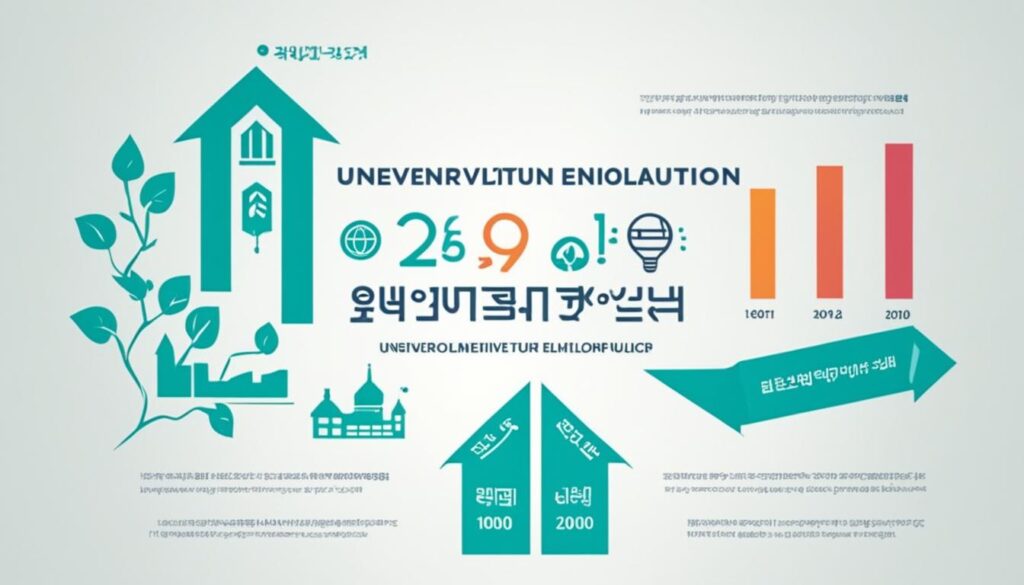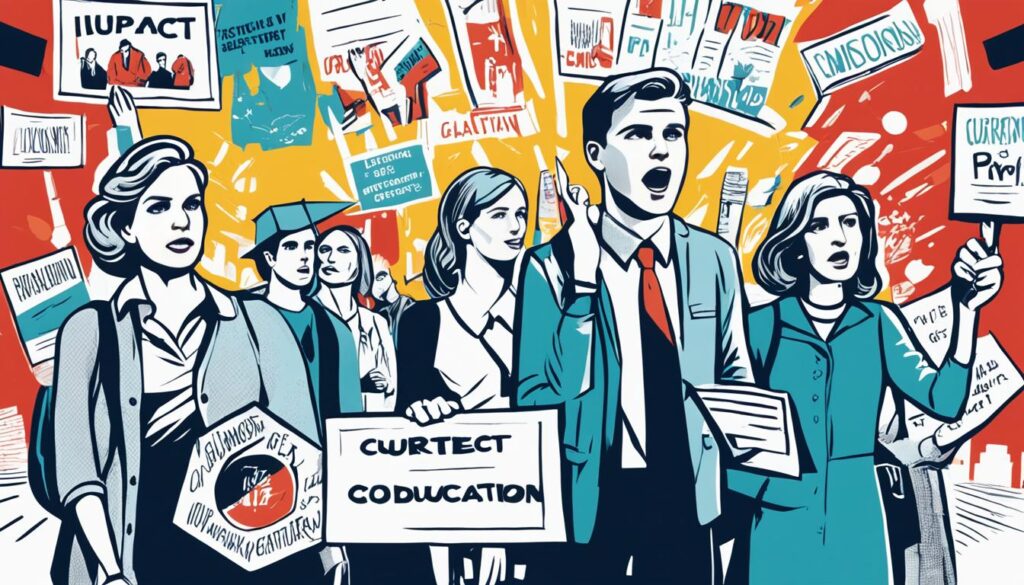“Education is the passport to the future, for tomorrow belongs to those who prepare for it today.” – Malcolm X
Welcome to “Korean Insights: Navigating Opportunities in Higher Education,” where we delve into the world of Korean higher education and explore how it shapes academic and career success. South Korea’s emphasis on education has made it a global leader in university enrollment rates. However, concerns about the quality of higher education have arisen, raising questions about its ability to prepare students for an ever-evolving, technology-driven world.
In this article, we will examine the current state of Korean higher education, discussing the challenges it faces and the strategies being implemented to enhance its quality. We will also explore the impact of these issues on academic achievement, competition in the job market, and social conflict. Furthermore, we will delve into the experiences of students pursuing higher education abroad, providing a comparative analysis of some of the world’s toughest education systems.
Through this exploration, we aim to shed light on the challenges and opportunities present in Korean higher education and provide valuable insights for students and educators alike. Join us on this journey as we navigate the landscape of Korean higher education and uncover pathways to academic and career success.
Key Takeaways:
- South Korea’s higher education system has one of the highest enrollment rates globally.
- Concerns about the quality of education in South Korea have led to a need for reforms.
- The lower quality of higher education in South Korea has consequences for academic achievement, job market competition, and social conflict.
- Strategies for enhancing the quality of higher education include strengthening university establishment standards, providing financial support, and easing competition among universities.
- Students pursuing higher education abroad face unique challenges and opportunities across various education systems worldwide.
The Current State of Korean Higher Education
South Korea boasts one of the highest university enrollment rates globally, with over 70% of young individuals enrolled in tertiary education institutions. However, despite this impressive figure, the quality of education provided by Korean universities often falls within the lower tiers when compared to other OECD countries. This disparity in quality can be attributed to several challenges that the Korean higher education system faces.

One of the primary challenges is the low standards for university establishment. With lenient criteria, many institutions that do not meet the benchmark for quality can still operate, compromising the overall standard of education. Additionally, Korean universities often struggle with insufficient financial support, limiting their ability to attract highly qualified faculty and invest in research and development programs.
Besides, the intense competition among universities for student recruitment poses a significant hurdle. This competition-driven environment can divert focus away from curriculum development and student services, leading to a decline in the quality of education provided.
To address these challenges and improve the quality of higher education, reforms are urgently needed in the Korean system. By raising the standards for university establishment, ensuring sufficient financial support, and promoting collaboration over competition, the Korean higher education system can strive to enhance the quality of education offered and provide students with the skills necessary to thrive in a fast-paced, technology-driven world.
The Impact of Current Higher Education Issues
The lower quality of higher education in South Korea has far-reaching consequences. Firstly, it hampers academic achievement among students, as they receive education that may not meet high standards. This limitation can hinder their ability to acquire the necessary knowledge and skills for future success in their careers.
Additionally, the subpar quality of education intensifies competition in the job market. Employers express concerns about the job readiness of graduates, as they may lack the necessary foundation to excel in their professional roles. This heightened job market competition further exacerbates the challenges faced by newly graduated students seeking employment.
Moreover, the quality disparity in higher education contributes to heightened social conflict. The stratification of universities based on quality perpetuates social inequalities, creating a divide between those who have access to high-quality education and those who do not. This inequality can lead to social unrest and dissatisfaction, as individuals face barriers to socioeconomic mobility.

Solutions for Enhancing the Quality of Higher Education
To enhance the quality of higher education in South Korea, several key solutions can be implemented. These solutions address the current challenges faced by the Korean higher education system, including university establishment standards, financial support, and competition among universities.
Strengthening University Establishment Standards
One of the primary steps towards enhancing the quality of higher education in South Korea is to strengthen the criteria for establishing universities. By enforcing stricter standards, only qualified institutions that meet the necessary requirements will be allowed to operate. This ensures that students receive education from reputable and accredited universities that uphold high academic standards.
Providing Increased Financial Support
Financial support is crucial for universities to attract qualified faculty and invest in research and development. By providing increased financial support, universities can enhance their academic programs, improve infrastructure, and create an environment conducive to innovative teaching and learning. This not only benefits students but also contributes to the overall development and progress of the higher education sector.
Easing Competition Among Universities
Competition among universities for student recruitment can sometimes hinder the focus on curriculum development and student services. By easing this competition, universities can allocate resources and efforts towards improving the quality of education they provide. This can be achieved through collaborative initiatives and partnerships, allowing universities to prioritize the holistic growth and success of their students.
Implementing these solutions will pave the way for significant improvements in the Korean higher education system. By ensuring stringent university establishment standards, providing increased financial support, and easing competition among universities, South Korea can enhance the quality of education and better prepare students for the challenges of a fast-paced and technology-driven world.

Challenges and Opportunities for Students Pursuing Higher Education Abroad
Pursuing higher education abroad has become increasingly popular among students worldwide. The opportunity to study in a different country offers a unique and enriching experience that goes beyond academics. Each country’s education system presents its own set of challenges and opportunities, shaping the learning journey of international students. In this section, we will provide a comparative analysis of some of the world’s toughest education systems, focusing on their curriculum rigor, examination difficulty, and acceptance rates at leading institutions.
Curriculum Rigor
When considering education abroad, one crucial aspect to examine is the curriculum rigor. Different countries have varying levels of academic intensity, with some emphasizing a more rigorous approach compared to others. Understanding the curriculum rigor will help you assess the academic challenges you may face and the level of intellectual rigor you can expect in your chosen field of study.
Acceptance Rates
Another crucial factor to consider when planning to study abroad is the acceptance rates at leading institutions. Acceptance rates can vary significantly between countries and universities, with some institutions being highly competitive and selective. By researching and analyzing acceptance rates, you can gain valuable insights into the level of competition you may face during the admission process.
Examination Difficulty
Examinations play a vital role in evaluating student performance and knowledge acquisition. The difficulty level of examinations can significantly impact your learning experience and academic success. Researching the examination difficulty in your prospective study destination will help you understand the level of preparation required to excel academically.
Additionally, it is crucial to consider the prevalence of stress and mental health issues among students in different education systems. The transition to a new country and educational environment can be challenging, and it’s important to prioritize your holistic well-being while pursuing your academic goals.
By exploring these factors, you will gain a comprehensive understanding of the challenges and opportunities awaiting you as a student pursuing higher education abroad. Empowered with this knowledge, you can make informed decisions and embark on a transformative educational journey.

South Korea’s Education System
South Korea is known for having one of the toughest education systems worldwide, with a key feature being the rigorous Suneung exam. This eight-hour test is a crucial factor determining university admissions and future career prospects for students.
The Suneung exam creates immense pressure and stress among South Korean students. The high-stakes nature of the exam, coupled with the competitive environment, often leads to mental health issues. The prevalence of stress among students is alarmingly high, highlighting the need for a balance between academic pursuits and overall well-being.
However, South Korea’s commitment to academic excellence cannot be understated. It is reflected in the country’s impressive rise in tertiary education attainment. South Korean students demonstrate a strong dedication to their studies and a drive for success, which contributes to their high achievements on both a national and global level.
In the midst of the challenges posed by the Suneung exam and the stress among students, South Korea’s education system continues to prioritize academic excellence as a foundational pillar for the future success of its students.
Finland’s Education System
In contrast to South Korea’s high-pressure environment, Finland takes a holistic approach to education, prioritizing the overall well-being and development of students. The Finnish education system is known for its emphasis on creativity, critical thinking skills, and student autonomy.
Unlike traditional education systems that focus on rote memorization and standardized testing, Finland encourages students to explore their interests, think independently, and participate in collaborative learning activities.
One of the key features of Finland’s approach is its teacher training program, which ensures that educators are well-equipped to foster creativity and critical thinking in their students. Teachers are given the flexibility to design their own curriculum based on the needs and interests of the students.
The Finnish education system also places a strong emphasis on equal opportunities for all students, aiming to minimize socio-economic disparities in education. This includes providing equal access to resources, support, and educational opportunities across different regions and schools.
However, recent studies have indicated a rise in mental health issues among Finnish university students. This highlights the need for comprehensive support systems to address the mental well-being of students and ensure a truly holistic approach to education.
Singapore’s Education System
Singapore’s education system is renowned for its competitiveness, placing a strong emphasis on academic excellence and human capital development. At the heart of this system is the GCE A-Level exam, widely regarded as one of the most challenging examinations globally. This rigorous exam not only tests students’ knowledge and understanding but also their critical thinking and problem-solving skills.
The GCE A-Level exam serves as a benchmark for students seeking admission to top local and international universities. Its demanding nature cultivates a culture of competitiveness among students, driving them to strive for high levels of achievement. While the pressure to perform well can be intense, it also prepares students for the challenges they may face in their future academic and professional pursuits.
Despite the high levels of stress associated with the GCE A-Level exam, Singapore boasts impressive tertiary education enrollment rates. This demonstrates the country’s commitment to investing in its human capital and ensuring that its students are well-prepared for the competitive global economy.
In addition to academic excellence, Singapore’s education system promotes holistic development, with a strong focus on character building, leadership skills, and values education. This well-rounded approach equips students with the necessary skills and qualities to succeed in both their personal and professional lives.
Moreover, the education system in Singapore is known for its strong partnerships between educational institutions, industries, and the government. This collaboration ensures that the curriculum remains relevant and aligned with the needs of the ever-changing job market, further enhancing students’ competitiveness and employability.
Overall, Singapore’s education system stands as a testament to the country’s dedication to nurturing highly skilled individuals who can contribute to the nation’s growth and development. It is a system that continuously strives for excellence and holds its students to high standards, preparing them to excel in a globally competitive world.
Conclusion
As you navigate the world’s toughest education systems, it is crucial to understand the unique nuances of each country’s education system. Some prioritize academic rigor, while others emphasize holistic development. To enhance your employability and future success, you must carefully consider factors such as reputation, affordability, and the opportunity for global learning experiences.
Reputation is key in today’s competitive job market. By attending universities with strong reputations, you can increase your chances of standing out to potential employers. Employers often seek graduates from institutions with a track record of producing high-performing professionals.
Affordability is another crucial consideration. Higher education can be expensive, especially in certain countries. By choosing programs that offer affordable tuition fees and scholarships, you can reduce the financial burden and ensure a smoother transition into your chosen career.
Global learning experiences are highly valuable in today’s interconnected world. By immersing yourself in diverse cultures and learning environments, you can develop a global mindset, strengthen your adaptability, and gain a competitive edge in the international job market. Look for institutions that offer study abroad programs or have partnerships with universities around the world.
Remember, success in any educational environment is not just about academics. Embrace the power of diversity and foster a culture of lifelong learning. By continuously expanding your knowledge, skills, and perspectives, you can unlock your full potential and thrive in any educational setting.
Source Links
- https://www.linkedin.com/pulse/navigating-academia-comparative-analysis-worlds-most-rigorous-sharma-axjgc?trk=public_post_main-feed-card_feed-article-content
- https://www.linkedin.com/pulse/paradox-prosperity-challenges-innovations-south-korean-maru-kim
- https://opportunities-insight.britishcouncil.org/news/reports/survey-analysis-perception-of-higher-education-among-korean-students


